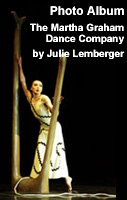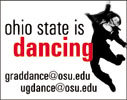



|
Home,
More Advice For Grown-Up Dancers ADVICE FOR GROWN-UP DANCERS 4/03/02: Back to Being Me: Steps in Parenthood By Anne
Wennerstrand, CSW, DTR (We want to know what you think! Got a response to Anne's ideas? Or another issue you want to talk about? E-mail anne@danceinsider.com.
A grown-up dancer writes, "I have an 18-month-old boy who was born with
special medical needs. I had become pregnant in the midst of a satisfying
professional dance career, but since I had the baby I have not been able to
get to class. When I first became a mom, this was not a problem. I had a
"higher calling" and felt completely satisfied being mom and mom only. But in
recent months I am feeling somewhat unfulfilled by my position in life, and
yet quite guilty for feeling that way. I also struggle with the financial
burden of going back to class and rehearsal. Can I really make enough money
as a dancer to justify the time away from my son? I know that many dancers
have been able to continue their careers with children in their lives, but
for me this was not the case. I do not want to leave you with the impression
that I am not completely proud, happy and content with being my son's mom.
He is the joy and pride of my life. But now I need to start getting back to
being me. . . a dancer, in order to be a better parent. Just where and how to
start?"
At issue here is the question of who we become and where our former selves
"go" when we become parents, along with other complicated issues associated
with parenting. When I was pregnant with my now six-month old son Liam,
friends told me that becoming a mother would change my life forever. I
remember thinking intellectually that I understood what they meant. In my
fantasy of the future I imagined "my life" and the baby becoming a part of
that life -- a changed life but with my essential sense of self intact. I
have since discovered that having a baby entails a complete
bio-psycho-social-spirtual transformation rendering me "before" (without
Liam) both unrecognizable and unfathomable. So much so, that I am surprised
when I recognize little bits of the former non-mommy "me" in my present life
-- the one just talking to a girlfriend on the phone or even sitting down in
front of my computer to write this column. Having a baby doesn't just change
you. You are no longer the person, the identity you once knew. This can be
a both exhilarating and frightening place to be.
Becoming a parent is a developmental milestone in life. It is similar in
that way to adolescence but with important differences. There has been so
much written on subjects related to becoming a mother or father for the first
time. There are probably hundreds of books out there on how-to parenting
from every conceivable (no pun intended) angle, not to mention thousands of
articles and studies on attachment, bonding, marriage, single parenthood,
adoption, gay parenting and a whole slew of topics related to these issues.
I won't pretend to have the breadth of knowledge to address these topics.
These books, studies and articles are maps which can help to navigate the
essentially unknowable terrain of parenting and which importantly help us
achieve at least some measure of knowability and control in the face of such
a momentous life happening. As Harriet Lerner says in her excellent book
"The Mother Dance": "The decision to have a child basically involves a leap
of faith. The reality of the unknown and the unknowable is true for other
life decisions as well, but to a far lesser extent."
Some dancers know they will continue their careers alongside with raising a
small child or children. Some dancers decide that this is an opportunity to
transition or retire from dancing. Some dancers take time off when their
children are very young and transition back into dancing as their children
become more independent. All of these choices are equally valid. Our
Grown-Up dancer posed the important question, "How can I get back to being
me, a dancer, in order to be a better parent?" Instinctively we know that at
a certain point in our child's development we will need to recapture some of
our former self-hood in order to better parent our child. And as dancers,
that self-hood includes reclaiming our dancing selves. We may even have the
foresight to make sure we can continue preserving our dancer "selves" as
much as we possibly can even in the early months of our child's life. But
this is a purely individual choice. It's like that by-now somewhat cliched
description of securing your own oxygen mask on a plane before reaching down
to put your child's on. You have to have your own oxygen source available to
really be there for your kid. For some that source may be in the form of
dancing, but for others it could be a different thing entirely (a moms' group,
for instance).
Everyone who becomes a parent has to grapple with certain important questions,
and dancers are no exception. If you are planning to continue dancing while
parenting a young child, how will you (and your partner if he or she is
involved) spend time, energy and money in the wisest fashion? Does your
partnership support communicating about these issues in constructive and
non-defensive ways? What choices will you need to make and/or forego? What
is your overall support system like? How comfortable are you asking others
for help? How will you determine child care? Dancers tend to be organized,
creative, disciplined and highly resourceful individuals who sometimes
underestimate their own abilities and the resources of their own communities.
A dancer who has prided herself on fierce independence in the past may need
to soften up in this area. Dancers belong to communities which may be able
to offer more support than anticipated. When you have a child you will tap
into inner and outer resources like never before and ultimately find things
much deeper and much richer than you could have ever imagined. No matter
what you are going through personally -- whether pregnant, mothering,
fathering,
or experiencing "the empty nest" -- remember you are not alone. The important
thing is to reach out for help and information. Perhaps the single most
important thing a grown-up dancer can do in preparation for motherhood is get
comfortable with the notion of asking for and being receptive to help from
unanticipated sources.
Anne Wennerstrand has a private psychotherapy practice in New York City and is available for individual, group and organizational consultation. To read more about Anne, please visit the "Contact Us" page.
|
